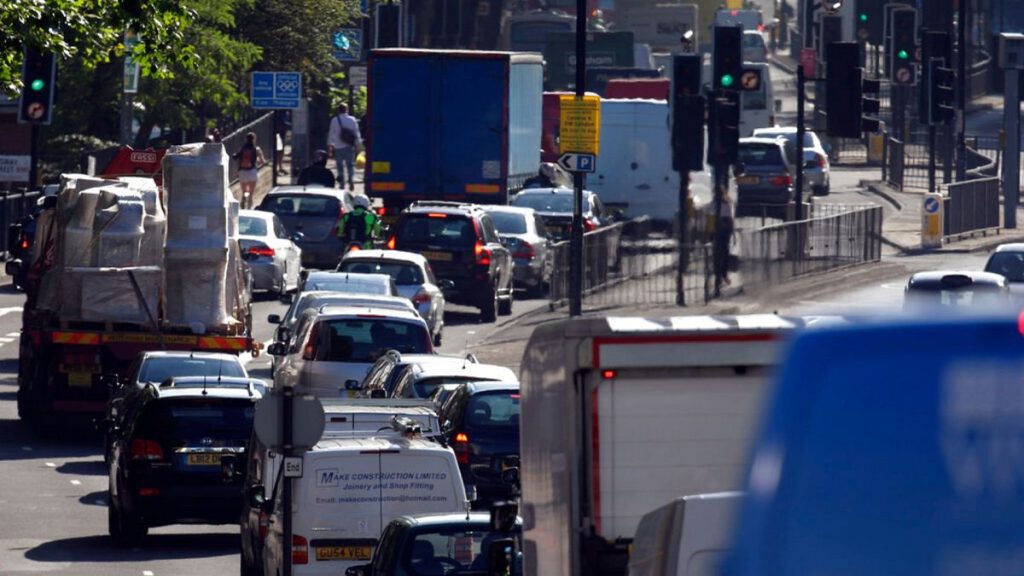London’s traffic congestion crisis continues to plague the city, earning it the dubious distinction of being the most congested city in Europe for the fourth consecutive year and the fifth most congested globally. In 2023, London drivers endured an average of 101 hours stuck in traffic, contributing to a staggering £3.85 billion (€4.64 billion) in lost productivity, equivalent to £942 (€1,135) per driver. This significant financial burden highlights the economic repercussions of persistent gridlock. The concentration of population, employment, and economic activity within the city, coupled with roadworks on critical arteries like the M25 Wisely Interchange, exacerbate the problem, creating major bottlenecks and contributing to the pervasive delays. Although London bears the brunt of the UK’s congestion, representing half of all traffic delays nationwide, other cities outside the capital experienced the most significant increases in traffic issues in 2023. UK drivers, on average, spent 62 hours ensnared in traffic jams.
London’s road network, including its crucial “red routes” – major thoroughfares where stopping, parking, and loading/unloading are prohibited – carries approximately one-third of the capital’s traffic. Transport for London (TfL), the local government body responsible for managing this network, acknowledges the challenge and emphasizes its commitment to facilitating safe, sustainable, and efficient movement throughout the city. TfL underscores its investments in walking, cycling, and public transport infrastructure as key strategies for alleviating congestion by encouraging Londoners to adopt environmentally friendly alternatives to private vehicles. Despite these efforts, the sheer volume of traffic on some of the UK’s busiest roads necessitates ongoing investment in advanced traffic management programs to optimize road usage.
Beyond London, several other European capitals also rank high on the congestion scale, highlighting a broader trend across the continent. The Inrix ranking, which considers both the duration of delays and the population size of each city, underscores the widespread nature of traffic congestion across Europe. Paris follows closely behind London as the second most congested city in Europe and the sixth globally, with drivers experiencing an average of 97 hours of delay in 2023. Dublin takes the third spot in Europe, with 81 hours of delay, while Rome and Brussels follow with 71 and 74 hours, respectively. This data underscores that traffic congestion isn’t solely a London issue but a shared challenge for major urban centers across Europe.
The persistent traffic congestion in London and other European cities raises significant concerns about its environmental, economic, and social impacts. Climate advocacy groups, such as Possible, highlight the detrimental effects of traffic on air quality and greenhouse gas emissions, exacerbating the climate crisis. The wasted time spent in traffic also represents a substantial economic loss due to reduced productivity and increased fuel consumption. Moreover, the stress and frustration associated with constant delays negatively impact the well-being of commuters, contributing to a decline in quality of life.
Addressing this complex challenge requires a multi-pronged approach that extends beyond simply improving traffic management systems. Promoting sustainable transportation alternatives, such as walking, cycling, and public transport, is crucial. Investing in efficient and affordable public transportation networks can incentivize people to shift away from private vehicles, reducing the number of cars on the road and easing congestion. Furthermore, urban planning strategies that prioritize pedestrian and cyclist-friendly infrastructure can create more livable and sustainable cities.
While Transport for London’s commitment to sustainable transport is a positive step, bolder actions are needed to tackle the root causes of congestion. Implementing congestion pricing mechanisms, such as charging drivers for entering congested zones during peak hours, can disincentivize unnecessary car trips and generate revenue that can be reinvested in public transportation improvements. Promoting flexible working arrangements and encouraging businesses to adopt staggered working hours can also help to spread out peak-hour traffic and reduce the strain on the road network. Ultimately, a comprehensive strategy that combines infrastructure improvements, policy interventions, and behavioral change is essential to effectively address the persistent challenge of traffic congestion in London and across Europe.
The recurring theme of London topping the list of Europe’s most congested cities highlights the urgent need for a paradigm shift in urban mobility. While technological advancements in traffic management can play a role, a more fundamental change in how people move around cities is essential. This requires a concerted effort from policymakers, urban planners, businesses, and individuals to create a more sustainable, efficient, and equitable transportation system that prioritizes people over cars. Moving away from a car-centric culture towards a more balanced approach that embraces active travel and public transportation is not just an environmental imperative but also a key to improving the quality of life for urban dwellers. The economic and social costs of inaction are simply too high to ignore, underscoring the need for bold and innovative solutions to address the growing problem of urban traffic congestion.










